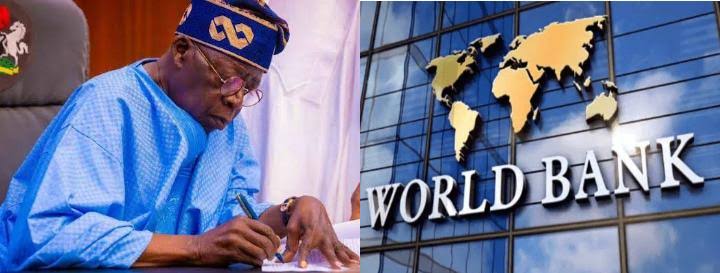Ola Akinwunmi
A stark divide has emerged between the Federal Government and the World Bank over Nigeria’s historic N54.9 trillion ($39 billion) 2025 budget, with the global lender cautioning that reliance on Central Bank overdrafts risks derailing the nation’s fragile economic recovery.
The World Bank issued a blunt criticism of Nigeria’s 2025 fiscal strategy, labelling the record-breaking budget “overly ambitious” and warning that unmet revenue targets could force the government to revive controversial Central Bank financing—a move that could reignite inflation and destabilize the naira.
President Bola Tinubu signed the budget—Nigeria’s largest ever—into law last week, up from an initial N49.7 trillion proposal. The plan allocates N23.96 trillion to capital projects and N14.32 trillion to debt servicing, with a projected deficit of N13.08 trillion to be funded by borrowing. Key assumptions include $75/barrel oil prices, 2.06 million barrels/day crude production, and a N1,400/$ exchange rate.
World Bank Lead Economist Alex Sienaert highlighted glaring gaps in these assumptions during the launch of the Nigeria Development Update report. Noting current oil production languishes at 1.6 million barrels/day—far below the budget’s 2.1 million target—he warned, “Meeting revenue goals will be extremely challenging.” Uncertainty around petrol subsidy savings and proposed windfall taxes on forex gains further clouds fiscal sustainability.
“If revenues fall short, Nigeria faces arrears or a return to deficit monetization,” Sienaert cautioned, referencing the controversial Ways and Means facility. Previous overdrafts under ex-President Buhari ballooned to N23 trillion, fueling inflation and currency turmoil. While Tinubu’s administration has pledged restraint, Sienaert stressed that renewed reliance on Central Bank financing would “shatter confidence in fiscal reforms.”
Minister of Budget and Economic Planning Abubakar Bagudu dismissed the World Bank’s concerns, insisting Nigeria’s oil grades command premium prices and that production could rebound. “Our projections are not ambitious—they’re realistic,” he argued, citing past output levels exceeding 2 million barrels/day.
The World Bank urged further reforms, including scrapping Nigeria’s electricity subsidy, which it called “regressive and wasteful.” While praising last year’s fuel subsidy removal and exchange rate unification, Sienaert emphasized that only half of the resulting revenue gains had reached federal coffers by January 2025.Criticism also targeted Nigeria’s delayed cash transfer program, designed to cushion reform impacts on 15 million households. Just 5 million have received payments so far, with Sienaert urging faster rollout to mitigate soaring living costs.
The report pressed Nigeria to prioritize private-sector-led growth, streamline trade policies, and slash governance expenses—including cuts to “non-essential” spending like vehicle purchases and foreign training. It also highlighted abysmal social sector investment, with education and health spending at 1.2% and 1.8% of GDP respectively—among the world’s lowest.
Despite tensions, the World Bank acknowledged Nigeria’s reforms could position it toward its 2030 GDP target. But Sienaert stressed success hinges on transparent oil revenue flows, tighter fiscal coordination, and curbing inflation, which remains at 33.7% despite recent monetary tightening.

